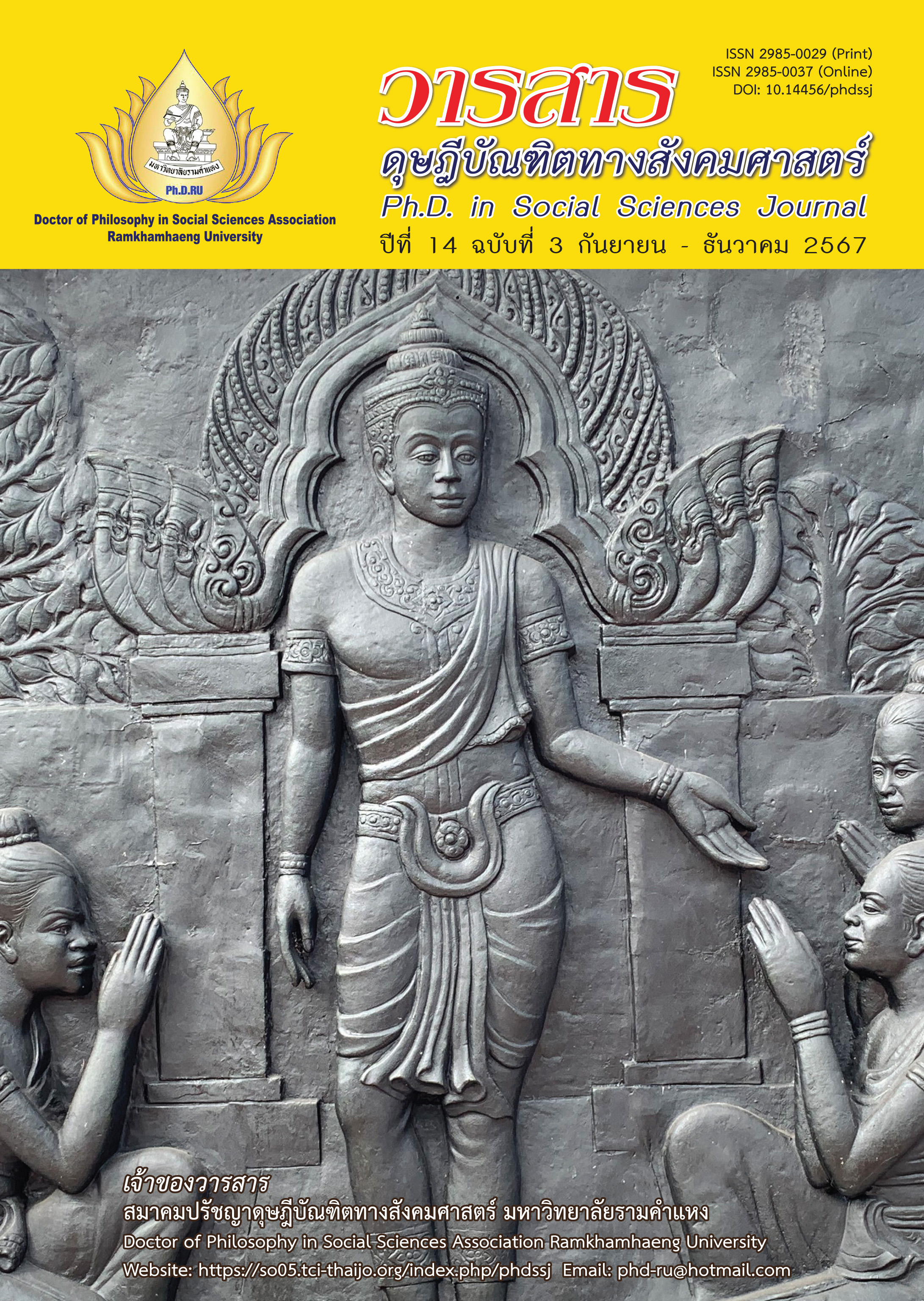การพัฒนาโปรแกรมการให้คําปรึกษาแบบกลุมเพื่อเสริมสร้างแรงจูงใจใฝ่สัมฤทธิ์ทางการเรียนของนักศึกษาอาชีวศึกษาใน 3 จังหวัดชายแดนภาคใต้ของประเทศไทย
Main Article Content
บทคัดย่อ
บทความวิจัยนี้มีวัตถุประสงค์เพื่อพัฒนาและตรวจสอบประสิทธิผลของโปรแกรมการให้คำปรึกษาแบบกลุ่มเพื่อเสริมสร้างแรงจูงใจใฝ่สัมฤทธิ์ทางการเรียนของนักศึกษาอาชีวศึกษาใน 3 จังหวัดชายแดนภาคใต้ของประเทศไทย เป็นการวิจัยกึ่งทดลอง (quasi-experimental research) ตัวอย่าง คือ นักศึกษาวิทยาลัยเทคนิคปัตตานี ระดับประกาศนียบัตรวิชาชีพ (ปวช.) และระดับประกาศนียบัตรวิชาชีพชั้นสูง (ปวส.) จำนวน 32 คน เครื่องมือที่ใช้ในการวิจัย ได้แก่ (1) โปรแกรมการให้คำปรึกษาแบบกลุ่มเพื่อเสริมสร้างแรงจูงใจใฝ่สัมฤทธิ์ทางการเรียน และ (2) แบบวัดแรงจูงใจใฝ่สัมฤทธิ์ทางการเรียน ทดสอบสมมุติฐานด้วยสถิติ Non-Parametric ได้แก่ The Sign Test และ The Wilcoxon-Mann-Whitney Test
ผลการวิจัย พบว่า (1) โปรแกรมการให้คำปรึกษาแบบกลุ่มเพื่อเสริมสร้างแรงจูงใจใฝ่สัมฤทธิ์ทางการเรียนของนักศึกษาอาชีวศึกษาใน 3 จังหวัดชายแดนภาคใต้ของประเทศไทย ประกอบด้วย 4 ขั้นตอน ได้แก่ ขั้นเริ่มต้น ขั้นหัวเลี้ยวหัวต่อ ขั้นดำเนินการ และขั้นยุติ จำนวน 12 ครั้ง ครั้งละ 1 ชั่วโมง 30 นาที และ (2) โปรแกรมการให้คำปรึกษาแบบกลุ่มเพื่อเสริมสร้างแรงจูงใจใฝ่สัมฤทธิ์ทางการเรียนมีประสิทธิผลต่อการเสริมสร้างแรงจูงใจใฝ่สัมฤทธิ์ทางการเรียนของนักศึกษาอาชีวศึกษาใน 3 จังหวัดชายแดนภาคใต้ของประเทศไทย กลุ่มทดลองหลังเข้าร่วมโปรแกรมการให้คำปรึกษาแบบกลุ่มมีแรงจูงใจใฝ่สัมฤทธิ์ทางการเรียนสูงกว่าก่อนเข้าร่วมโปรแกรมการให้คำปรึกษาแบบกลุ่ม และมีแรงจูงใจใฝ่สัมฤทธิ์ทางการเรียนสูงกว่ากลุ่มควบคุมอย่างมีนัยสำคัญทางสถิติที่ระดับ .05 และเมื่อสิ้นสุดการติดตามผลเป็นระยะเวลา 4 สัปดาห์ กลุ่มทดลองทั้งสองระดับ แรงจูงใจใฝ่สัมฤทธิ์ทางการเรียนยังมีความคงทน อีกทั้งยังพบว่า นักศึกษาที่เป็นกลุ่มทดลองหลังเข้าร่วมโปรแกรมการให้คำปรึกษาแบบกลุ่มมีแรงจูงใจใฝ่สัมฤทธิ์ทางการเรียนไม่แตกต่างกัน
Article Details

อนุญาตภายใต้เงื่อนไข Creative Commons Attribution-NonCommercial-NoDerivatives 4.0 International License.
บทความวิชาการ บทความวิจัย และบทวิจารณ์หนังสือในวารสารดุษฎีบัณฑิตทางสังคมศาสตร์ เป็นความคิดเห็นของผู้เขียน มิใช่ของคณะผู้จัดทำ และมิใช่ความรับผิดชอบของสมาคมปรัชญาดุษฎีบัณฑิตทางสังคมศาสตร์ มหาวิทยาลัยรามคำแหง (กรณีการทำวิจัยในมนุษย์ ผู้วิจัยต้องผ่านการอบรมจริยธรรมการวิจัยในมนุษย์ และนำหลักฐานมาแสดง)
เอกสารอ้างอิง
Akbari, O., & Sahibzada, J. (2020). Students’ self-confidence and its impacts on their learning process. American International Journal of Social Science Research, 5(1), 1-15.
Aziz, A. R. A. (2022). The effectiveness of reality therapy in group counseling to achieve student motivation for academic well-being. International Journal of Academic Research in Business and Social Sciences, 12(8), 886-898.
Bhat, R. I. (2022). Self–confidence and its impact on students academic achievement: An overview. Journal of Emerging Technologies and Innovative Research, 9(2), d174–d180.
Bunyawong, S. (2022). Motivation to achieve the development of quality of life. In Guidance and the quality of life (5th ed., unit 10). Sukhothai Thammathirat Open University Press. [In Thai]
Chaiyaphan, M. (2019). Human behavior development. Chulalongkorn University Press. [In Thai]
Corey, G. (2012). Theory and practice of group counseling (8th ed.). Brooks/Cole Cengage Learning.
Feldman, R. S. (2008). Essentials of understanding psychology (7th ed.). McGraw-Hill.
Issara, N. (2018). Education management process for education value added of the institute of southern vocation 3. Master’ Thesis of Education (Education Research and Evaluation), Prince of Songkla University. [In Thai]
Kaewkangwan, S. (2022). Psychology of life development at all ages. In Psychology for living (6th ed., unit 3). Sukhothai Thammathirat Open University Press. [In Thai]
Karimi, A., & Saadatmand, Z. (2014). The relationship between self–confidence with achievement based on academic motivation. Kuwait Chapter of Arabian Journal of Business and Management Review, 4(1), 210-215.
Khowtrakul, S. (2022). Educational psychology (14th ed.). Chulalongkorn University Press. [In Thai]
Kongkham, C. (2018). The development of intergrative group counseling model for enhancing learning goal motivation of students. The Journal of Psychiatric Nursing and Mental Health, 32(1), 66-85. [In Thai]
Koolnaphadol, P. (2022). Adolescent counseling (5th ed.). Burapha University, Faculty of Education. [In Thai]
Lone, R. A. (2021). Self-confidence among students and its impact on their academic performance: A systematic review. International Journal of Creative Research Thoughts, 9(5), i561-i565.
Ministry of Education, Office of the Vocational Education Commission. (2017). Vocational education development plan 2017-2036. Author. [In Thai]
Ministry of Education, Office of the Vocational Education Commission. (2023). Mission and policy. Retrieved from https://www.vec.go.th/Default.aspx?tabid=87 [In Thai]
Moneva, J. C., & Tribunalo, S. M. (2020). Students’ level of self-confidence and performance tasks. Asia Pacific Journal of Academic Research in Social Sciences, 5(1), 42-48.
Phothawin, T. (2019). The condition of adolescence. In Adolescent development (4th ed., unit 1). Sukhothai Thammathirat Open University Press. [In Thai]
Prinyapol, P., & Chongruksa, D. (2013). Psychoeducational group counseling for academic achievement of undergraduate students in Thailand in the southern unrest province. Procedia–Social and Behavioral Sciences, 84, 76-81.
Royal Society. (2021). Dictionary of education: Royal Society (2nd ed.). Author. [In Thai]
Salam, N. H. Z., & Astuti, B. (2023). The effectiveness of group counseling reality for students’ academic procrastination behavior. European Journal of Education Studies, 10(2), 222-231.
Sopah, R., Yosef, Y., Dewi, R. S., Kushendar, K., & Purwati, P. (2023). Academic resilience through reality approach group counseling: Quantitative study taking social support and independence into account. Bulletin of Counseling and Psychotherapy, 5(2), 113-121.
Thompson, R. A. (2016). Counseling techniques: Improving relationships with others, ourselves, our families, and our environment (3rd ed.). Routledge.
VandenBos, G. R. (Ed.). (2015). APA dictionary of psychology (2nd ed.). American Psychological Association.
Wongchinda, T. (2023). All Vocational Students who drop out of school can return 100%. Retrieved from http://edunewssiam.com/th/articles [In Thai]


